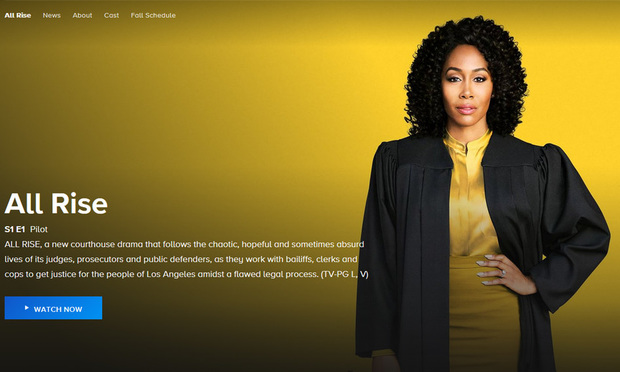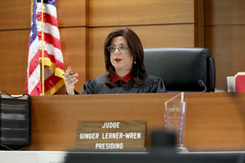Florida Judges Rolling Their Eyes Over New CBS Courtroom Drama 'All Rise'
"In the real world, the objections would have been flying," Broward Circuit Judge Shari Africk Olefson said about CBS' new courtroom drama, "All Rise," depicting a prosecutor's rise to the bench.
September 30, 2019 at 10:06 AM
7 minute read
 In a new courthouse drama on CBS, Simone Missick plays prosecutor-turned-judge Lola Carmichael. Courtesy photo.
In a new courthouse drama on CBS, Simone Missick plays prosecutor-turned-judge Lola Carmichael. Courtesy photo.
New CBS drama "All Rise" follows a California prosecutor's rise to the bench as she begins " pushing the boundaries and challenging the expectations of what a judge can be."
But it has some South Florida judges cringing.
Though Broward Circuit Judge Shari Africk Olefson was happy to see TV that exposes the general population to life in the judiciary, she was slightly alarmed to see the main character, Judge Lola Carmichael, having ex-parte conversations in stairwells, getting involved in public defenders' private lives and addressing parties on a first-name basis in the courtroom.
"I think that in the real world, the objections would have been flying," Africk Olefson said. "And probably complaints. She would have been asked to recuse herself."
Judges are bound by a code of ethics that requires them to avoid any behavior that could even give the impression of impartiality. But the show seems to disregard that, in Broward County Judge Mardi Levey Cohen's view.
"In the first few minutes, I was like, 'Wow, a woman who's a judge, a minority, this is great,' " Levey Cohen said. " But there were too many ethical violations for it to be realistic and for it to help the public understand what judges do."
Africk Olefseon agrees: It's all fun and games until members of the public assume the judiciary actually acts the way Carmichael does in the show.
"Everything falls apart if people start thinking that judges are not applying the law fairly. Who's going to follow the law?" Africk Olefson said. "I think there's no single case that's more important than the overriding priority, which is public faith in the judiciary."
Though it goes without saying that TV shows tend to exaggerate when depicting real life occupations, Levey Cohen said she worries "All Rise" could undermine the public's perception of judges.
"I think that the judiciary really doesn't lend itself to television," Levey Cohen said. "Because there's drama, but we don't get involved in the cases."
Levey Cohen said that after watching the fictional judge go on an independent fact-finding mission to help protect a defendant's interests, or skirt ethical boundaries through her close friendship with a prosecutor, viewers might wonder whether they'd be treated fairly in court.
 Fort Lauderdale- Judge Ginger Lerner-Wren
Fort Lauderdale- Judge Ginger Lerner-Wren"We're humans. When we sentence people and we make rulings, yes, our emotions, our knowledge and experience does come into play," she said. "However, we temper that with neutrality of the law and what we're supposed to do in our job."
But it's not all bad, according to Broward County Judge Ginger Lerner-Wren, who noted that Carmichael's character "demonstrated many of the values and judicial stylings of many judges who practice in problem-solving courts."
"It's fair to say the writers need to brush up on the judicial canons of ethics," Lerner-Wren said. "Yet, as a woman and pioneer of America's first mental health court, it was exciting to see the law humanized and a judge presiding with kindness."
'Never in a million years'
The most comical moment, according to Africk Olefson, was when Carmichael walked into a room full of judges sitting around having coffee.
"Never in a million years can I imagine that happening," she laughed. "We are all working all the time. I've been out to lunch maybe twice."
Broward County Judge Corey Amanda Cawthon watched the show with her nonlawyer boyfriend, to whom she provided a live fact-checking experience, commenting about what was accurate and what wasn't.
"I've always been jealous of all my doctor friends watching shows like Grey's Anatomy, who can comment on it, and we've never really had that, so it's fun to watch it now," Cawthon said.
The most unrealistic moment, she said, came when Carmichael put her robes on over a full suit and jacket.
"It's way too hot for that," Cawthon said.
'Don't call me judge'
The show did a good job of capturing the strange, sometimes awkward transition from lawyer to judge, according to Levey Cohen, who related to a scene where Carmichael was taken aback by her prosecutor-friend calling her "your honor."
"At first, you tell everybody, 'Don't call me judge,' but then everybody keeps calling you judge and finally one day you accept it," Levey Cohen said. "It starts out you don't really want to be treated differently, but you realize that you have to be treated differently because the office, at least when you're wearing your robes, requires that. And then when you're off the bench you're still a judge in a way, too."
Cawthon, who rose to the bench in January, said she related to a conversation between Carmichael and her prosecutor-friend, who became upset when the newly appointed judge changed her stance on a long-held opinion.
"He was like, 'I don't understand, a couple weeks ago this is what you were thinking.' And she made a comment to him that, 'When you're a judge, the buck stops with you,' " Cawthon said. " The thinking is different. It just is. Because when you're an attorney you're so geared toward winning your side of it, and when you're a judge you have to consider both sides and consider what's fair. There's just completely different considerations that come into it and it just is such a heavier weight that falls on your shoulders."
It's like going from team member to umpire, Cawthon said.
"It's hard, because sometimes you'll see an argument that should be made or an objection that should be made, and it's not your place to do that anymore," she said.
 Judge Shari Africk Olefson.
Judge Shari Africk Olefson.For Africk Olefson, it rang true to see the fictional judge stop to take a deep breath before entering the courtroom for the first time, because it's something she does every day.
"I stop at the door, and I just take a moment to take a few breaths and just kind of get in the mindset and recognize that I'm not walking in there as me, I'm walking in there as the legal system and the law," Africk Olefson said. "Everything else, you have to leave at the door."
Levey Cohen shared that sentiment.
"I think every single judge went through that the first time they ever walked out there with their robes and got announced and everybody stood up," Levey Cohen said. "It still catches my breath, and I've been a judge for eight years."
"All Rise" airs Mondays at 9 p.m. EST on CBS.
Read more:
'You Don't Look Like a Judge': Female Jurists, Lawyers Mistaken for Assistants
Where Are They Now? Florida Lawyers Featured in Netflix's Ted Bundy Documentary
This content has been archived. It is available through our partners, LexisNexis® and Bloomberg Law.
To view this content, please continue to their sites.
Not a Lexis Subscriber?
Subscribe Now
Not a Bloomberg Law Subscriber?
Subscribe Now
NOT FOR REPRINT
© 2025 ALM Global, LLC, All Rights Reserved. Request academic re-use from www.copyright.com. All other uses, submit a request to [email protected]. For more information visit Asset & Logo Licensing.
You Might Like
View All
U.S. Eleventh Circuit Remands Helms-Burton Trafficking Case Involving Confiscated Cuban Port
3 minute read
Miami Lawyer Guilty of Indirect Criminal Contempt But Dodges Paying Legal Fees
4 minute read

Winston & Strawn Snags Sidley Austin Cross-Border Transactions Partner in Miami
2 minute readTrending Stories
Who Got The Work
Michael G. Bongiorno, Andrew Scott Dulberg and Elizabeth E. Driscoll from Wilmer Cutler Pickering Hale and Dorr have stepped in to represent Symbotic Inc., an A.I.-enabled technology platform that focuses on increasing supply chain efficiency, and other defendants in a pending shareholder derivative lawsuit. The case, filed Oct. 2 in Massachusetts District Court by the Brown Law Firm on behalf of Stephen Austen, accuses certain officers and directors of misleading investors in regard to Symbotic's potential for margin growth by failing to disclose that the company was not equipped to timely deploy its systems or manage expenses through project delays. The case, assigned to U.S. District Judge Nathaniel M. Gorton, is 1:24-cv-12522, Austen v. Cohen et al.
Who Got The Work
Edmund Polubinski and Marie Killmond of Davis Polk & Wardwell have entered appearances for data platform software development company MongoDB and other defendants in a pending shareholder derivative lawsuit. The action, filed Oct. 7 in New York Southern District Court by the Brown Law Firm, accuses the company's directors and/or officers of falsely expressing confidence in the company’s restructuring of its sales incentive plan and downplaying the severity of decreases in its upfront commitments. The case is 1:24-cv-07594, Roy v. Ittycheria et al.
Who Got The Work
Amy O. Bruchs and Kurt F. Ellison of Michael Best & Friedrich have entered appearances for Epic Systems Corp. in a pending employment discrimination lawsuit. The suit was filed Sept. 7 in Wisconsin Western District Court by Levine Eisberner LLC and Siri & Glimstad on behalf of a project manager who claims that he was wrongfully terminated after applying for a religious exemption to the defendant's COVID-19 vaccine mandate. The case, assigned to U.S. Magistrate Judge Anita Marie Boor, is 3:24-cv-00630, Secker, Nathan v. Epic Systems Corporation.
Who Got The Work
David X. Sullivan, Thomas J. Finn and Gregory A. Hall from McCarter & English have entered appearances for Sunrun Installation Services in a pending civil rights lawsuit. The complaint was filed Sept. 4 in Connecticut District Court by attorney Robert M. Berke on behalf of former employee George Edward Steins, who was arrested and charged with employing an unregistered home improvement salesperson. The complaint alleges that had Sunrun informed the Connecticut Department of Consumer Protection that the plaintiff's employment had ended in 2017 and that he no longer held Sunrun's home improvement contractor license, he would not have been hit with charges, which were dismissed in May 2024. The case, assigned to U.S. District Judge Jeffrey A. Meyer, is 3:24-cv-01423, Steins v. Sunrun, Inc. et al.
Who Got The Work
Greenberg Traurig shareholder Joshua L. Raskin has entered an appearance for boohoo.com UK Ltd. in a pending patent infringement lawsuit. The suit, filed Sept. 3 in Texas Eastern District Court by Rozier Hardt McDonough on behalf of Alto Dynamics, asserts five patents related to an online shopping platform. The case, assigned to U.S. District Judge Rodney Gilstrap, is 2:24-cv-00719, Alto Dynamics, LLC v. boohoo.com UK Limited.
Featured Firms
Law Offices of Gary Martin Hays & Associates, P.C.
(470) 294-1674
Law Offices of Mark E. Salomone
(857) 444-6468
Smith & Hassler
(713) 739-1250






